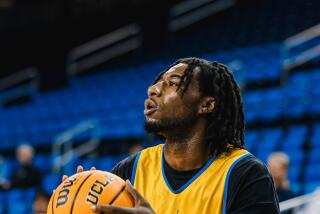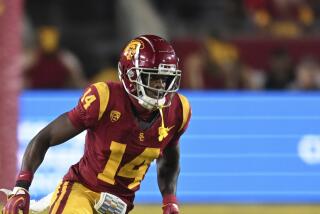In Rerun of 1986, USC Women, UCLA Men Win Dual Meet
On an excitement scale, the USC-UCLA women’s track meet Saturday at Drake Stadium almost reached the same level as last year’s meet.
The Trojan women won, 69-67, the identical score of the 1986 meet. However, in that meet, the outcome wasn’t decided until the final event, the 1,600-meter relay.
The suspense wasn’t stretched out quite as long Saturday, with USC wrapping up the meet in the next-to-last event, the 200 meters, by placing second and third.
As for the men’s meet, again the score was the same as last year. UCLA reaffirmed that it has, perhaps, the strongest dual meet team in the country by beating previously unbeaten USC, 104-59, before a crowd of 4,400.
UCLA’s men concluded the dual meet season with a 9-0 record, and they are 27-0 since Bob Larsen became coach in 1985.
Once again, UCLA’s versatile Gail Devers was virtually a one-woman track team. She won four events, 100, 200, 100 low hurdles and long jump, ran an electrifying leg on the sprint relay team, making up about an eight-meter deficit on the anchor leg, and placed third in the triple jump.
Last year, she competed in seven events and won four. In three seasons, she has entered 19 events in the dual meet against USC, winning 13.
“I’m just trying to help my team to the best of my ability,” Devers said. “I’m a team-oriented person. But, losing to USC two years in a row is hard to swallow.”
Devers said she might have gotten tired, if she had any time to think about her multi-event performance.
There were some noteworthy performances on a clear, warm day at Westwood, namely:
--USC’s Wendy Brown set an American record in the triple jump at 44 feet 11 3/4 inches. The old mark was 44-9 3/4, established by Terri Turner of Texas in 1986.
--USC’s Eric White, a non-scholarship athlete, set a meet record in the pole vault at 18-0 1/2, breaking the 10-year-old meet record of UCLA’s Mike Tully by a quarter of an inch.
--UCLA’s Mike Marsh closed fast to beat USC’s Pancho Morales in the 100. Marsh was timed in 10.27 seconds. Marsh had to pull up at the start of the 200 later with a cramp in his calf. Larsen said the injury wasn’t serious.
--UCLA’s Henry Thomas won the 400 in 45.66 without seemingly extending himself.
In the decisive women’s 200, Devers, competing in her sixth event, won, as expected, in 23.04, just barely holding off a fast-closing Gervaise McCraw of USC. The Trojans’ Myra Mayberry came through to finish third, which is worth one point.
Fred LaPlante, USC’s women’s coach, said his team got off to a good start by sweeping the javelin. “I felt our team was ready after the first three events, and we weren’t intimidated by competing at Drake Stadium.”
LaPlante said the 800 was a key event for his team. The Trojans went 1-2 with Lesley Noll and Michelle Taylor, while Laura Chapel, who had won the 1,500 earlier, faded to fifth.
“I think that our Shannon Clark and Elise Lyon took a lot out of Chapel in the 1,500 and she was tired for the 800,” LaPlante said.
On the men’s side, the Trojans have been hurt by some injuries and ineligible athletes, but the Bruins have an exceptionally strong team. They’ll most likely be named by Track & Field News as the nation’s best dual-meet team.
“Everything has come together extremely well for us,” Larsen said. “We’re pointing for the Pacific 10 and NCAA championships. We were strong enough to go through the dual meet season without pushing everyone to the wall.”
The Bruin men have beaten the Trojans nine straight times and 13 out of the last 15.
NCAA scholarship limitations impose a burden on private schools with high tuition costs. However, the USC women are prospering with more scholarships, 16 to 14 for the men, and fewer events than the men.
“The NCAA president’s council wants to make a 15% cut in scholarships in some sports, taking track down to 13 or 12 grants,” USC Coach Ernie Bullard said.
If that happens, Bullard said he may have to examine some options, such as USC not emphasizing dual meets and concentrating on the NCAA meet, or, perhaps, adopting an international scoring system in dual competition.
International scoring allows for only two competitors per event with points awarded on a 5-3-2-1 basis, first through fourth.
“We’ll just have to examine what’s best for us,” Bullard said.
Larsen said that the disparity between the men’s teams, once very competitive, is more pronounced this year because of the strength of UCLA’s team.
Larsen acknowledged that USC has some particular problems, adding that he hopes the Trojans will continue to maintain a dual meet schedule.
He suggested that in some years a third team should be added to the annual dual meet between the schools.
“In that way, excitement could be stretched out over more events,” he said.
The Trojans, without much depth, forfeited some events, such as the 400-meter relay and the 1,500 meters, in which they didn’t have an entry.
Track Notes
UCLA Coach Bob Larsen is hopeful that scholarships in track aren’t further reduced by the NCAA. “We were cut unmercifully. It went from unlimited scholarships to 24 and then down to 14,” he said . . . UCLA’s Kevin Young won the 400-meter intermediate hurdles in 49.65, the long jump at 24-7 and was third in the high hurdles. Steve Kerho won that race in 13.76, ahead of USC’s Robert Reading (13.89) . . . USC’s Yvette Bates was an impressive second in the triple jump behind teammate Wendy Brown with a leap of 44-0 1/2 . . . UCLA’s Brian Blutreich was a double winner, taking the shotput at 60-2 1/2 and the discus at 189-2 . . . USC’s Eric Schermerhorn won the 800 in 1:49.05 with teammate Ray Griffin second (1:49.20) . . . USC’s women led, 65-57, after 14 events, then got four points by going second and third in the 200 to clinch the meet. USC Coach Fred LaPlante had doped the meet as a 68-68 tie.
More to Read
Go beyond the scoreboard
Get the latest on L.A.'s teams in the daily Sports Report newsletter.
You may occasionally receive promotional content from the Los Angeles Times.






